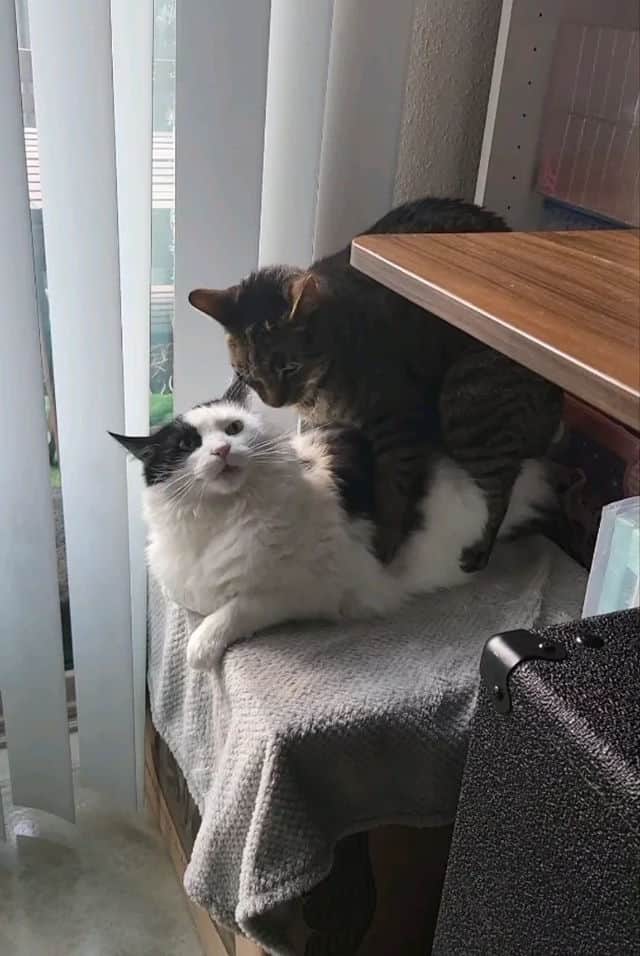Disclosure: We may earn a commission from helpful, relevant links in our content. No cost to you. See our privacy policy.
A common misconception is that male cats will hump dogs because of dominance, but that is NOT the case. The cat humps the dog almost always because of boredom, stress, or anxiety. Other times, it’s a redirected play behavior.
The most frequent explanation of this behavior is when something in the cat’s surroundings has recently changed, such as the addition of a new family member or when you move to a new location.
Contrary to popular belief, a cat humping a dog isn’t about dominance. Cats don’t have dominance hierarchies often ascribed to male cats. They can be aggressive, frustrated, and territorial. They do not, however, exhibit dominance hierarchies.
Interestingly, while both cats and dogs may display humping behaviors, the motivations differ. Dogs often hump as a form of play or due to excitement, while cats lean more towards stress or environmental changes as triggers.

Is It Normal for a Cat to Hump a Dog?
Male cats are the most prone to humping, especially if they are not neutered.
If it’s a male cat that hasn’t been neutered, it’s probably just a redirected sexual urge. Otherwise, it’s not typical and could be caused by stress, anxiety, or a lack of exercise and playtime for the cat.
None of the fixed male cats I’ve met that were neutered as kittens had any sexual desire, so I’d say humping is normal but unusual. The cat could have been exposed to the smells of a nearby cat in heat, and testosterone can trigger this behavior.
If your cat is bored or looking for attention, you may want to try playing with them or giving them more affection, as the humping may not be sexual.
Animals that need more exercise may often discover methods to acquire it, which may be in a different way than you prefer. Thus, the humping. Your cat may need more play and other activities to burn off its daily energy.
Do Cats Stop Humping After Being Neutered?
Even neutered cats can hump, especially if the cat is fixed later in life. Neutering does not eliminate all testosterone. Depending on the cat and the situation, humping things is either a pleasant physical sensation or a problematic habit.
Neutering your cat might reduce humping behavior but may not eliminate it.
Cats, in their unique way, differ from dogs in sexual behaviors. While a dog might hump to establish dominance, a cat’s humping, especially towards a dog, is more layered, often signaling deeper underlying issues.
Neutering a cat is a quick, uncomplicated, and painless process that will leave him much happier, safer, and healthier. Male cats do not have a “heat” like females, but if you do not fix your male cat, you may see much more humping in the future.
Sexuality is not a matter of joy and happy cuddling for cats. Instead, it is violent and painful, yet they do it out of compulsion based on their instincts. If you neuter your cat, it will be less distracted and more focused on playing and hunting.
Should You Stop a Male Cat From Mounting?
When cats exhibit undesirable behavior, it is almost always due to illness or a lack of an appropriate environment provided by humans.
Cats communicate in nuanced ways. Their mounting behavior, especially when it’s a cat humping a dog, is a sign of various underlying triggers. Dogs, however, might hump for simpler reasons, such as excitement or seeking attention.
Regardless of what or who he’s mounting, your male cat could be mounting for various medical reasons. Finding out what is bothering the cat, or asking yourself if your cat is getting all it requires, is a much better solution than simply taking the cat away from the dog.
If you’ve already exhausted these options, you can try a few more things.

How to Stop Your Cat From Humping Your Dog?
First, if your cat hasn’t had a recent exam, you should take him to the vet. Sick cats are known to do strange things. Because cats are prey animals and do not exhibit illness as a survival tactic, it is pretty easy for owners to overlook it.
Increase your cat’s enrichment. Look for cat enrichment, cat food puzzles, and similar terms on Google and elsewhere (here they are on Amazon). Increase your cat’s exercise by engaging in more interactive play with fish pole toys, fetch, or anything your cat enjoys.
Make sure your cat has plenty of bright, warm resting spots if this behavior is related to territory. While cats are usually territorial towards other cats, it’s not unheard of for them to exhibit the same behavior towards other pets and even humans.
Teach your cat the target cue. You can use this cue to interrupt and divert unpleasant behavior once he understands it. When your cat is mounting or engaging in unwanted behavior, ask him to target and then redirect him to another activity.
While it might seem like a humorous or odd situation to many, a cat humping a dog can be a sign of deeper issues. Addressing it not only enhances the wellbeing of both pets but also strengthens their bond.
Here’s one method for teaching a cat to use a target stick:
If you use punishers like shock collars and spray bottles, slap, shove, or yell at them, you may end up causing more difficulties than just this increasing issue. Remember that punishment is ineffective on cats, even as simple as locking them in a room.
Might be interested in: Dog Face Humping Explained
FAQs
Why would a cat hump an owner?
Some cats hump when insecure stressed, or need extra affection. If your cat is bored, frustrated, or constrained, it will hump. This behavior can be triggered by changes in the household, such as adding new members.
Why does my cat hump my arm?
Your cat may hump your arm for the same reasons a dog does – stress, anxiety, or something else may be bothering the cat. While neutered cats may hump things due to residual testosterone in their bodies, humping is frequently an indication of a problem.
Can cats and dogs mate?
It is not possible. Cats and dogs cannot mate because their genetics are too dissimilar to produce offspring. Cats and dogs have genetic differences that make it impossible for one to become pregnant from the other.
Alex, a passionate animal lover, has experience in training and understanding animal behavior. As a proud pet parent to two dogs and three cats, he founded AnimalReport.net to share insights from animal experts and expand his knowledge of the animal kingdom.




